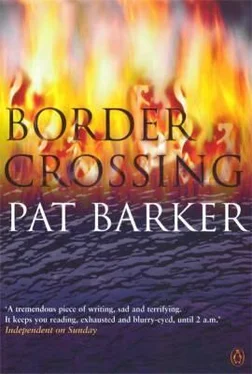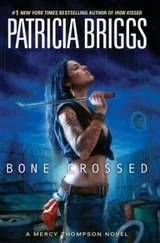He had no right to blame Lauren for talking about their sexual difficulties, but he did. Somewhere in the back of his mind, as he and Roddy parted, was the picture of a rope, fraying, one strand after another coming apart.
That evening, Tom read the report he’d written after his visit to the remand centre to see Danny.
A dry, formal account of his assessment of the child.
Nothing in it about arriving early. Nothing about the hot sunshine, or the prickly sweat on the backs of his thighs, or the photographs, sliding out of a file on the back seat. Nothing about the red-hot pokers standing as witnesses to it all, eyeless and mute.
Nothing, either, about the shock of seeing Danny come into the room. He knew he was a child, and yet he was unprepared for the sight of the small boy walking along the corridor and into the room beside the warder. Because of his age, Danny had been asked whether he wanted somebody else to be present: his social worker, perhaps, or one of the warders, but he’d said no, and so, after the warder withdrew and closed the door behind him, they faced each other alone.
Danny sat sideways in his chair, holding on to the radiator behind him, an odd thing to do, Tom thought, in the heat, until he touched it himself and realized it was the coldest object in the room. The windows were high, made of frosted glass. Nobody could see either out or in. But when Tom suggested opening one of them, Danny, speaking for the first time, whispered, ‘No. Somebody might hear.’
He took his hands off the radiator and covered his ears, pressing in and out. Tom’s voice would be reaching him, if at all, as a muffled roar, masked by the whispering of his own blood. He screens out sounds, Tom thought. So sounds are important to him — voices are important. He made a conscious effort to speak gently, to ask simple questions. What did he prefer to be called? Did he like Daniel, or Danny, or Dan?
‘Danny.’
‘Have you got any pets, Danny?’
‘A dog.’
‘What’s it called?’
‘Duke.’
‘What sort of dog is it?’
‘A bull mastiff.’
‘When you lived at home did you take him for walks?’
He shook his head.
‘Why not?’
A shrug. ‘Just didn’t.’
The first ten minutes were spent like this.‘Have you got your own room?’
‘Yes.’
‘What’s it like?’
‘Okay.’
‘What can you see out of the window?’
‘A wall.’
‘What sort of things do you do?’
A shrug.
‘Do you have lessons?’
‘Yes.’
‘With the other boys?’
‘No, just me.’
‘What’s that like?’
‘Hard.’
‘Why’s it hard?’
‘I’ve got to answer all the questions.’
Danny wasn’t deceived. He knew the hard questions were coming, and that here too there would be nobody else to answer them.
‘What do you do after lessons?’
‘Watch telly.’
‘What’s your favourite programme?’
‘Football.’
‘Do you go outside?’
‘Yes.’
‘On your own?’
‘No, with a warder.’
‘Do you play with the other boys?’
‘No.’
‘Why not?’
‘They’re too big. They wouldn’t want to play with me.’
‘Would you like to play with them?’
‘No.’
‘Why not?’
At last, eye contact. A snarl of impatience. ‘Because they’d kick me head in.’
‘Why would they do that?’
Danny opened his mouth to tell Tom exactly why, then clamped it shut. He shrugged again, this time no more than a twitch of the shoulders. ‘Because.’
He was a child. He lived in the present, and the present was dominated by his fear of the big boys. He was afraid that, one day, the warders would leave his door unlocked, and then the big boys would get him.
‘But the warders won’t do that, will they?’
‘How do you know? They might.’
‘They won’t, Danny.’
He looked away, unconvinced.
‘Is there anything else worrying you?’
He muttered something that Tom had to ask him to repeat.
‘The trial.’
‘What about the trial?’
‘Everybody looking at me.’
‘In the dock? But there’ll be somebody with you. You won’t be on your own.’
‘Yes, I will.’
Those words, the fact that Danny didn’t need to amplify them, and knew he didn’t, marked a turning point. He took his hands away from his ears, leant forward, began to speak more freely. That day he talked endlessly about his father, how good he was at building things, how they used to go rabbiting together.
‘But he doesn’t live with you any more, does he?’
‘No.’
‘When did he leave? I mean, how long ago?’
‘A year and…’ He counted. ‘Four months.’
‘How did you feel about that?’
Nothing, not even a shrug. Danny didn’t do feelings.
Over the next two hours, as Tom probed his emotional and moral maturity, his mental state, his fitness to stand trial in an adult court, Danny came out with some startling opinions. Startling in a child.
‘Is it wrong to kill somebody?’
‘Not always.’
‘When is it all right?’
‘If you’re a soldier.’
‘But if you’re not a soldier, is it wrong?’
Danny shrugged. ‘Thousands of people get killed all the time, all over the world. You know, people look at the telly, and they say, “Oh, isn’t that awful?” But they don’t mean it.’
‘So people getting killed doesn’t matter any more?’
‘Not much.’
‘What about Mrs Parks? Lizzie. Do you think it matters that she was killed?’
‘I didn’t kill her.’
‘That’s not what I asked.’
Danny took so long to answer that Tom began to think he never would. ‘Yes,’ he said, at last.
‘A lot?’
‘She was old.’
‘So not a lot?’
Danny shook his head.
‘I want to get this clear, Danny. You’re saying it does matter that she’s dead?’
‘Yes.’
‘But not very much, because she was old?’
‘She’d had her life.’
For the first time he seemed to be quoting somebody else, though nobody would have said that to him about Lizzie. Tom sat back and took a moment to think. Immediately, Danny also sat back in his chair, a precise, almost synchronous mirroring of Tom’s movement. Casually, Tom changed position again, this time resting his hands on the arms of his chair. Danny did the same. This was deliberate mimicry, not the unconscious echoing of the other person’s posture that occurs in a conversation that’s going well.
‘You know when you used to go rabbiting with your dad. Did you ever kill a rabbit?’
‘Yes.’
‘Do you think it’s different, killing a rabbit and killing a person?’
‘Yes.’
‘How is it different?’
Danny looked Tom full in the face. ‘Rabbits run faster.’
He was an arrogant little bastard. ‘But do you think people surfer more?’ Silence. ‘Somebody who was suffocated might suffer quite a bit.’ Silence. ‘Wouldn’t they?’ She, he wanted to say.
‘Yes, but then they’d be dead.’
‘So it wouldn’t matter any more?’
‘No, they’d be dead:
‘When people, or animals, die, do they stay dead?’
Danny looked at him as if he’d gone mad.’ ‘Course they do. You wring a chicken’s neck, you don’t expect to find it running round the yard next morning, do you?’
Tom glanced down at his fingernails. ‘So Lizzie can’t come back?’
The question distressed Danny so much that for a while Tom thought he might have to suspend the interview. He held Danny’s wrists, saying, ‘C’mon, breathe. It’s all right, Danny. Breathe.’ At last, when he was relatively calm, Tom said, ‘You can tell me, you know.’
Читать дальше












